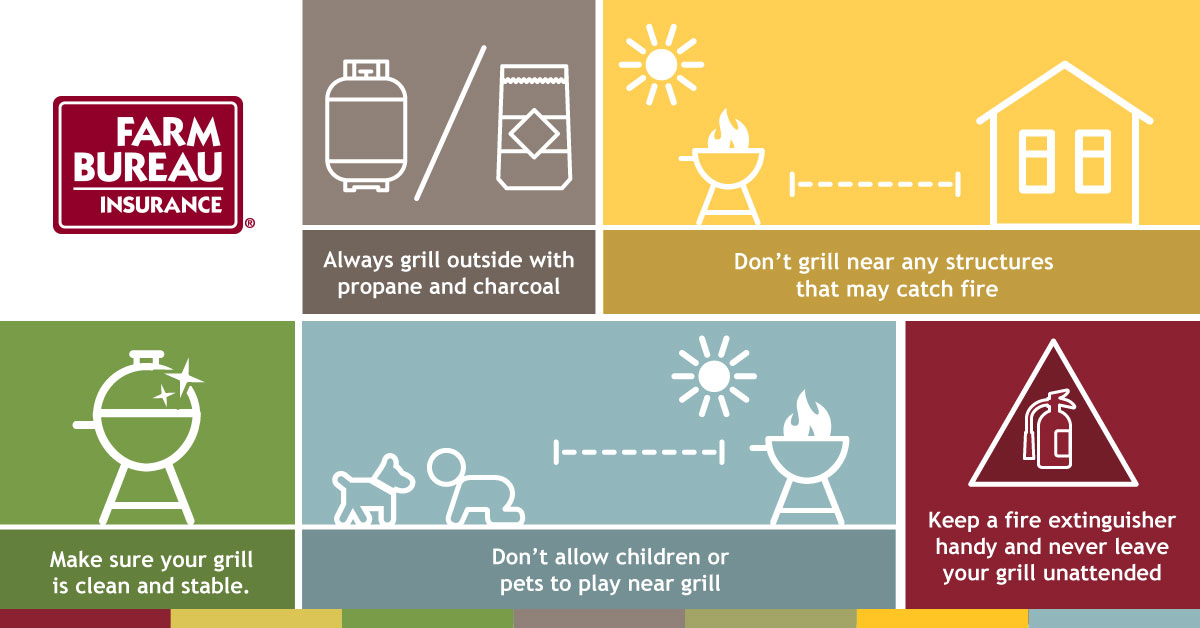5180
Grilling Safely All Year Long
Did you know that every year there are as many as 200,000 cooking-related fires, which cause hundreds of deaths and injuries throughout the U.S.? Last year in Virginia, there were 69 home fire fatalities.²
While millions of people safely enjoy cookouts each year, thousands of people visit emergency rooms because they accidentally burn themselves while barbecuing.¹
If a grill fire spreads to your property, your homeowners insurance provides protection. A homeowners policy covers fires that:
- Damage a house
- Damage personal possessions such as patio furniture
- Damage insured structures on the property, such as a shed or deck
- Injure a guest, under the liability portion of the policy
You’ll have to pay your deductible before insurance kicks in, so if damage is minimal and your deductible is high, it may not make sense to file an insurance claim.
The best way to enjoy outdoor barbecues is to prevent accidents by maintaining your grill and using it safely. Whether you use gas or charcoal, here are some tips for safely grilling any time of the year!

Pre-Grill Check
- Do a safety check. Check hoses for leaks or breaks before using a grill for the first time. Check for rust damage in metal grills, which may make it possible for charcoal to fall through onto surfaces below and cause a fire.
- Choose a safe location for your grill.Use propane and charcoal grills outdoors only. Place grills on a level surface away from the house, garage or other structures. The grill should be placed away from deck railings and out from under eaves and overhanging branches—anything that could burn. Never use a grill in a garage, vehicle, tent or other enclosed space, even if it’s ventilated, due to risk of harmful carbon monoxide buildup.
- Safety zone for kids and pets. Keep children and pets 3 feet away from your grilling area and where hot food is prepared or carried. Charcoal grills often remain hot for many hours after the flames are extinguished so make sure to keep the little ones away.
- Keep the grill going on a cold day.During cool weather days, avoid wearing a scarf or other loose clothing that may catch on fire. Consumer Reports magazine recommends shielding the grill from wind, placing it about 10 feet from combustible surfaces and materials, and keeping the lid closed to retain as much heat as possible. Allow extra time for pre-heating the grill in colder weather, and check temperatures of meat and fish with a meat thermometer to ensure that food is safe to eat.
While Grilling
- Turn on with lid up. Never turn on the gas when the lid is closed. The gas may build up inside, causing the lid to blow off and cause injuries or burns.
- Keep watch. Don’t leave the grill unattended. If you smell gas while cooking, get away from the grill immediately and call the fire department. Do not attempt to move the grill.
- No more combustible liquids. Do not add charcoal starter fluid when coals or kindling have already been ignited. If the fire is too low, rekindle it with dry kindling and more charcoal if needed. Avoid adding liquid fuel or any other flammable or combustible liquid to get the fire started because it can cause a flash fire.
Post-Grilling Cleaning, Maintenance and Storage
- Post-grill check. After cooking, make sure you completely close the valve on your gas grill.
- Post-grill clean up. Remove grease or fat from the grills and in trays below the grill. If you need to dispose of the coals, soak them in water to extinguish before disposing of them in a non-flammable container. Cover the grill tightly and close any vents to extinguish the coals.
- Store the grill away from the house. Always store gas grills—and propane tanks—outside and away from your house.
In Case of an Accident
If a grilling accident does occur, injuries should be taken care of immediately. Run cool water over minor burns, but do not cover injured areas with bandages, butter or salve. In the case of more serious burns, visit an emergency room or urgent care facility. When in doubt, call 911.
Once you have dealt with any injuries, assess your property damage and, if the situation calls for it, contact your insurance professional to discuss filing a claim.
- https://www.usfa.fema.gov/data/statistics/
- https://www.usfa.fema.gov/data/statistics/states/virginia.html